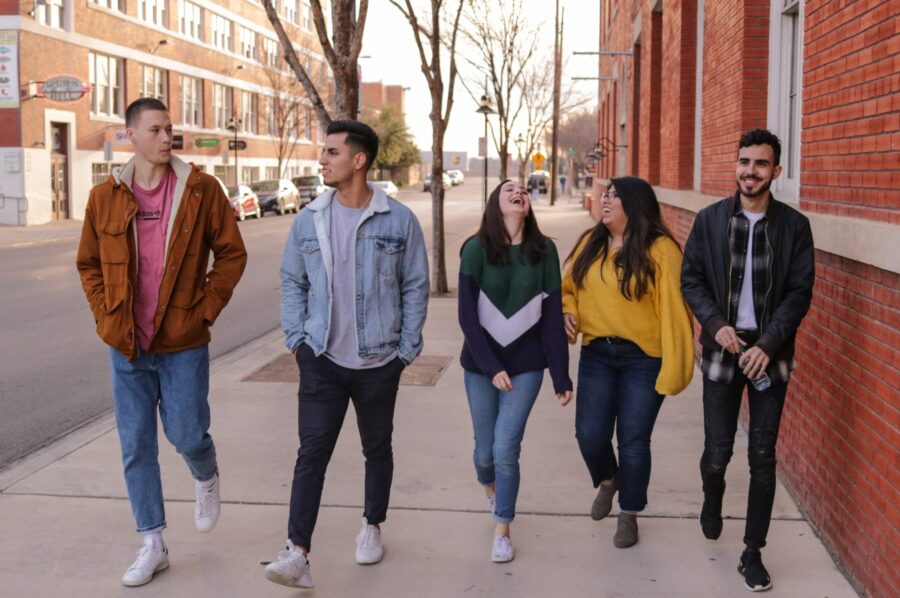Friends Are Good for Your Health – So How Do You Make One?
Want to be healthier? Hang out with your friends, a Washington Post article suggests. Turns out, friends are good for your mental and physical health.
Although romantic love is sometimes touted as the pinnacle of human relationships, in key areas, it is friendship that matters most. People with strong friendships tend to have better mental health. Not only that, research has shown that “large social networks lower our risk of premature death more than exercise or dieting alone.”
One long-term study in Sweden tracked over 700 middle-aged men. The six-year study “found having a life partner didn’t affect the risk of heart attack or fatal coronary heart disease — but having friends did.”
Why are friends good for our health?
Friends help us cope with stress and face difficult things. A University of Virginia study showed that numerous people were intimidated at the prospect of climbing a steep hill. But people rated the hill less challenging when they were standing next to a friend than those who were alone.
According to the article, “Brain imaging studies suggest that friendship affects brain systems associated with reward, stress and negative emotions, offering an explanation for why social connection benefits mental health and well-being.” Research shows that having friends provides protection from the negative effects of adverse experiences.
Which is all well and good if you have a friend, but what if you don’t?
How do you make a friend?
University of Maryland professor Marisa G. Franco, author of Platonic: How The Science of Attachment Can Help You Make — and Keep — Friends, has suggestions on where to start:
Join a book club, take a class or play a sport. Join a group centered around something you like to do. Interacting with other people who share your interests can lead to friendship. In a fascinating University of Maryland study, cadets who simply sat next to one another in police academy were more likely to become good friends. “It’s what researchers call ‘propinquity,’ being in proximity to others,” the article explains. Franco says it’s proof “that friendship isn’t magical” but possible for everyone.
Take the initiative. Don’t let negative self-talk shoot down your efforts. Assume other people will like you. “People like you more than you think,” Franco noted. “I know it’s scary to reach out but it’s likely to end more positively than your brain is assuming.”
Invite friends to things you’ve already planned. If it feels daunting to issue an invitation or plan a social event, why not start small? “Ask yourself: Are there parts of your day right now that you’re doing anyway that you can just do in community with other people?” Franco suggests. Invite someone to join you in going to the gym or running errands at the mall.
If you’re feeling lonely, you’re not alone.
Experts have talked about an epidemic of loneliness. Adam Smiley Poswolsky, the author of Friendship in the Age of Loneliness, describes loneliness as the perceived gap between the relationships you have and the relationships you want in your life.
Social media can make us feel worse, exacerbating our perception of loneliness by bombarding us with photos and videos of friends and acquaintances seemingly spending their time without us, Poswolsky explained.
“It’s something we don’t talk about but everyone is struggling with it,” said Poswolsky. “No one feels like they can talk about it because there’s a lot of shame associated with loneliness.”
So if you’d like to feel less lonely, forget shame – why not do something about it?
Billy Baker, the author of We Need to Hang Out, shares his personal journey, realizing in his midlife that he lacked the kind of friends he had had in high school or college. Recognizing he didn’t have many people he could call if there were an emergency in the middle of the night, he started a “fraternity of neighborhood dads” who met on Wednesday nights just to hang out. The group took off and now meets at other times as well.
Chances are if you’re feeling disconnected or lonely, someone else is too.
For more on the benefits of friendship, and how to connect with others, read the full article here.
Amenabar, Teddy. “For better health, tending to your friendships is as important as getting to bed early or eating well.” The Washington Post, 9 Jan 2023, https://www.washingtonpost.com/wellness/2023/01/09/how-to-adult-friends-relationships/.
Photo by Eliott Reyna on Unsplash



